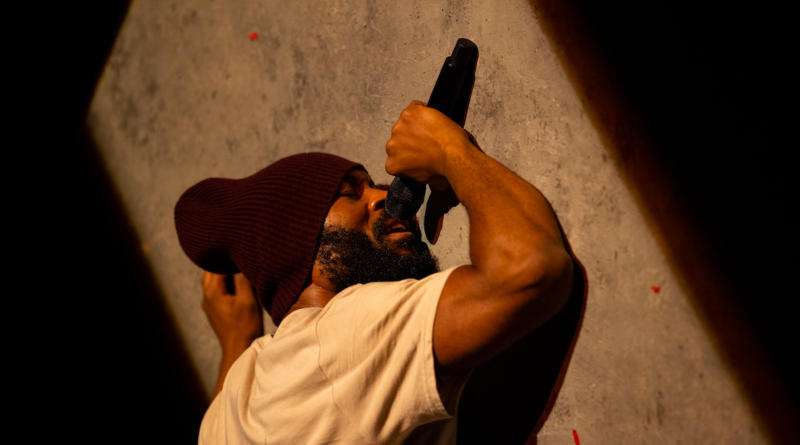REVIEW: ‘Misty’ is powerful metatheatre that sparks conversation
Photo: Misty, written and performed by Arinzé Kene, continues at The Shed’s Griffin Theater. Photo courtesy of Maria Baranova / The Shed / Provided by Polk & Co. with permission.
NEW YORK — Misty, Arinzé Kene’s moving and unforgettable show, has landed like a wake-up call in Midtown Manhattan at the fairly new theatrical-art complex known as The Shed. Within the Griffin Theater, audience members take their seats to pulsating music emanating from the speakers. When the show properly starts, Kene takes the stage and launches into a wondrously uncategorizable theatrical exploration that marries poetry with song with drama with political commentary with pathos and profundity.
Misty and its important themes stay with the audience long after the final bows.
Kene, with a microphone in hand, has multiple goals with the show, which he wrote and previously performed in London’s West End. One strand throughout the evening follows the performer as he’s trying to mount original work as a Black artist. This particular example of metatheatre — a story about the story being created — seems autobiographical, especially in light of Kene’s helpful “From Idea to Page” notes in the playbill. His written narrative about a conversation he had with an usher at the Young Vic Theatre is quite telling and seems to inform the work being staged at The Shed.
Another strand involves the negative impacts that gentrification can have on communities of color. Kene’s songs and words center on the loss of neighborhoods to latte franchises and development deals, and how this encroachment can be suffocating and life-disrupting. By examining this important social issue, Kene is able to dissect it, personalize it and give voice to those who often go voiceless when gentrification takes hold. The microscope expands to many other societal problems, everything from systemic racism to discrimination in the arts. Kene tries to weather these storms and keep his vision, his passion and his identities intact.
Helping the performer tell these stories are two on-stage musicians: Liam Godwin and Nadine Lee, both serving as co-music directors. They also take to the microphones and directly enter the narrative as characters who interact with Kene, mostly through voicemail messages. Godwin plays Raymond, while Lee plays Donna. Also, Ifeoluwa Adeniyi and Braxton Paul alternate as a little girl who has a pivotal role in the piece.
There’s a lot to take in throughout the two hours of Misty. The transitions between the various chapters can be sudden and harsh, which seems to be part of the point. Director Omar Elerian has a skillful hand at letting the energetic theatricality move and transform throughout the evening. He utilizes a simple, but effective set by Rajha Shakiry that allows multiple perspectives. At the center of the stage is the main performing area for Kene, but there are also hidden spaces that take on important meaning as the story unfolds.
One motif that is utilized throughout Misty is the use of orange balloons and Kene’s inability to escape them. It’s best to keep the details of this image secret for unsuspecting theatergoers, but the performer takes this visual metaphor and connects it to the story — a narrative that is filled with pain and poetry, revelation and revolution.
Perhaps some of the sections of Misty work better than others. Perhaps, to some, those sudden transitions make the piece seem fragmented and disconnected. For most theatergoers though, the heartfelt and heart-filled story that Kene expertly performs, while offering a simultaneous commentary track on the hatred and hypocrisies of society, is resoundingly powerful and tragically pertinent.
Misty was first performed in 2018, which today feels like a century ago, but as Kene deftly proves, the issues of racism that he explores are still present and need to be addressed. Many of these issues of inclusion and exclusion, authorship and artistry are best examined in a theatrical setting. As one character puts it: “[T]his modern war is in the mind, working from a psychological perspective. This psychological engineering program is disseminated to you through news, education, radio, television, film — deployed in all sectors right from the government to … the theatre.”
With Misty, one feels invited to a performance about how that performance came to be, and the story that emerges over the course of two hours is truly transcendent, as if the walls of The Shed are made of glass and all of New York City’s neighborhoods and communities are within view.
By John Soltes / Publisher / John@HollywoodSoapbox.com
Misty, written and performed by Arinzé Kene, continues through April 2 at The Shed’s Griffin Theater in New York City. Directed by Omar Elerian. Running time: two hours, with intermission. Click here for more information and tickets.

